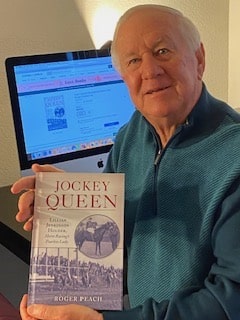Local author writes of trailblazer

A Columbia resident recently published a biography documenting the life of a trailblazing horse jockey.
Roger Peach is originally from and attended high school in Venice. He graduated from Southern Illinois University Carbondale with a journalism degree, and has worked for a number of papers and magazines.
He currently resides in Columbia, though he and his wife also spend the winter in Las Vegas to enjoy time with family.
Despite his more urban upbringing, he found himself diving into rural life when he was a teenager, working on a farm down in Pinckneyville when he was 16 and showing cattle around various county fairs.
It was through working this county fair circuit he came to know of Lillian Jenkinson Holder.
“I was at the Pinckneyville fair, and the horse races were going on,” Peach said. “I walked up to watch the races one afternoon with my boss, and around the final turn headed for the wire, this one particular jockey just looked like they were on fire. The rage in the face and so forth, and long hair was coming out the back of the helmet.”
Speaking with his boss, he was able to hear about Holder and her many years as a jockey. Though they never came to know each other very personally, he and Holder would occasionally regard each other at fairs given she knew Peach’s boss.
This was back in the 1960s, as Peach recalled. It would take several decades for his recently released book, Jockey Queen: Lillian Jenkinson Holder, Horse Racing’s Fearless Lady, to start coming together.
Peach recalled his biography on Holder effectively came about given a chapter he wrote in his previous book Swamper Tales, which covers his experiences traveling to work at county fairs.
This particular chapter concerned horseracing and jockeys, and, as Peach touched on Holder’s riding, he wanted to reach out to one of her living relatives so they could look over his work.
He managed to find Holder’s niece on Facebook, though, on reaching out to her, she wasn’t very responsive at first.
Peach was able to get in touch with her son who urged her to speak with him. As Peach recalled, she had been rather unhappy with previous articles and coverage of Holder.
“I guess I convinced her to at least give me a chance,” Peach said. “For a couple years, we did nothing but have occasional phone conversations in which I kind of filled in the blanks about Lillian’s life. I was pleasantly surprised that there was a lot more depth to her than what I initially thought. She was more than just a fantastic rider.”
Holder, as Peach explained, was born and raised on a Holstein dairy farm near Monroe, Neb., in 1909. As one of five daughters, she began helping with milking chores on the farm when she was 10 years old.
Peach noted that this work – milking cows with her bare hands and hauling milk pails back and forth through her youth – helped her develop plenty of upper body strength, the sort of physical ability that would help her handle a horse years down the line.
Along with running a dairy farm, Holder’s father also owned a few thoroughbred horses and she would similarly help out by exercising them regularly.
When she was still fairly young, Holder joined her father as he was entering a horse into a race, though all the participating jockeys already had other mounts secured.
As Peach said, Holder saw this as an excellent opportunity and offered to serve as jockey.
She would not have been able to participate given she was a girl, but her father obliged. Holder tucked her hair into her helmet, and her father took care of the entry work, not lying about her identity on any of the forms but simply counting on the fact that those overseeing the race would overlook her.
Holder placed second, and folks only realized she was a girl after the race.
“She really felt that this was a turning point in her life,” Peach said. “She had no fear of racing against these other jockeys and their horses or anything. She just did her job, and she knew right at that point that she could become a good jockey. And she did do that.”
This was the start of Holder’s jockey career which stretched from 1926 to 1971.
Peach recounted a number of highlights from Holder’s life which seemed to stick out to him as he was putting Jockey Queen together.
He noted that her family, like any other farming family at the time, struggled through the Great Depression and Dust Bowl, though Holder was able to help keep the family afloat thanks to one particular horse, Just Beans, that came of age at the right time. Her racing earned the family about $45,000 – a tremendous sum for the time.
Peach also placed great focus on the sexism Holder faced throughout her career as a jockey.
Though a fair amount of her peers were pleasant, many male jockeys treated her quite poorly. Peach noted that Just Beans was forced into retirement after his leg was broken when another jockey bumped into him during a race. The family was able to mend his leg afterward, and he fathered several foals.
Peach recalled a story he had heard from one of the jockeys he spoke to for the book.
When he was just a teenager, this jockey witnessed a race in which Holder came out of the gate, and two other jockeys knocked her and her horse to the ground.
This jockey checked on her, and Holder promised she’d teach those two a lesson some day.
In a race that very next day, Holder grabbed one of the jockeys by the foot to flip him off his horse and beat the other after the race.
Peach stressed that Holder was never one to start a fight – her character was such that the harshest words she would say were “dang” and “darn” – but she was certainly strong and willing to stand up for herself when someone tried to put her down.
Peach recalled speaking to another jockey that spoke to who she was as a person.
“He told me that a lot of people out there have heard about Lillian, and there’s been a lot of insinuations about her being a rough rider and stuff like that, and it’s not really true,” Peach said. “I kind of look at this as keeping her from being forgotten about.”
Peach further expressed his wish that Holder’s story could have been told much sooner, preferably when she was still alive to contribute to such a biography.
Indeed, Peach said he knew of a sports columnist from Pinckneyville who worked elsewhere that knew of Holder and had signed her to a movie contract, though nothing ever come of this besides preliminary writing.
Peach suggested such a movie could be very good. He compared the start of Holder’s career to the movie National Velvet.
Ultimately, Holder proved very successful throughout her career as a jockey, though she was prevented from competing in high-level races as she was, on three occasions, denied a jockey license despite meeting all physical requirements.
Peach said Jockey Queen could cater to a rather wide audience.
“I think this book is really for anybody that likes horses. It would be a good book for them,” Peach said. “Women and girls who, in their lives, might face certain difficulties in careers, that sort of thing, could use a little bit of Lillian as a role model – somebody that never gave up.”
He also pointed to one particular picture included in the book which he felt encapsulates Holder, her work ethic and her spirit: three sisters out on the prairie fixing a broken wagon.
Jockey Queen: Lillian Jenkinson Holder, Horse Racing’s Fearless Lady is published by Rowman & Littlefield and is available through most popular retail booksellers.






